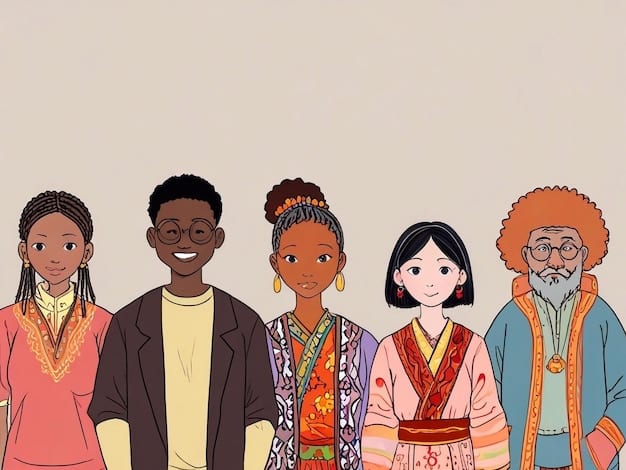How US Soft Power Shapes Global Opinion: Culture, Education, Diplomacy

Advertisements
The United States leverages its soft power—culture, education, and diplomacy—to profoundly influence global opinion, fostering international cooperation and understanding without coercion.
In a world increasingly interconnected, understanding the nuances of how nations project their influence goes beyond military might or economic leverage. The concept of How US Soft Power Influences Global Opinion: Culture, Education, and Diplomacy offers a fascinating lens through which to examine America’s global impact, shaping perceptions and fostering relationships that often resonate deeper than traditional foreign policy.
Understanding the Pillars of US Soft Power
Soft power, a term coined by scholar Joseph Nye, refers to a nation’s ability to attract and persuade others through its culture, political values, and foreign policies, rather than through military force or economic coercion. For the United States, this influence is deeply embedded in its societal fabric and its interactions with the world. It is the subtle, pervasive force that shapes global opinion, fostering goodwill and alignment of interests.
The essence of soft power lies in its voluntary acceptance. When people around the world embrace American music, pursue higher education in the US, or admire its democratic principles, they are, in effect, being influenced. This influence is not imposed but rather absorbed, making it incredibly resilient and far-reaching. It’s about attraction, not coercion, making it a powerful tool in international relations.
Cultural Resonance: A Global Language
American culture, from Hollywood blockbusters to jazz music and fast food chains, has permeated nearly every corner of the globe. This cultural ubiquity creates a sense of familiarity and often, admiration, which can translate into positive perceptions of the US. It’s a shared experience that transcends linguistic and geographical boundaries.
- Entertainment Industry: Hollywood movies and TV shows often portray American ideals, values, and lifestyles, making them accessible and appealing to a global audience. This narrative influence subtly shapes perceptions.
- Music and Arts: Genres like jazz, rock and roll, hip-hop, and pop music originating from the US have cultivated massive fan bases worldwide, often carrying messages of freedom, innovation, and self-expression.
- Consumer Brands and Trends: American global brands, from technology giants to fashion labels, establish a common consumer culture, associating the US with innovation, quality, and aspiration.
Beyond entertainment, American cultural institutions, such as museums and art galleries, also serve as platforms for exchange, promoting diverse perspectives and fostering cross-cultural dialogue. These interactions build bridges of understanding, often where traditional diplomacy might falter.
Educational Exchange: Minds Meeting Across Borders
The US education system, particularly its universities, is a magnet for international students. Studying in America offers not just academic knowledge but also an immersion in American society, its values, and its way of life. This experience often creates lifelong advocates for the US abroad.
Thousands of students from every continent come to the United States each year, returning to their home countries not only with degrees but also with a deeper understanding of American culture and values. This network of alumni represents a vast and influential pool of individuals who often rise to positions of leadership in their respective nations.
- Academic Excellence: American universities consistently rank among the best globally, attracting top talent and fostering research and innovation that benefits the world.
- Cultural Immersion: Studying abroad provides a profound cultural exchange, fostering mutual understanding and building personal connections that endure long after graduation.
- Leadership Development: Many international alumni return to become leaders in business, government, and academia, often maintaining positive sentiments towards the US.
Fulbright programs and other exchange initiatives are prime examples of how educational diplomacy works. These programs cultivate a deeper appreciation of the US while also enriching American society with global perspectives. It’s a two-way street of learning and influence.
Diplomacy’s Gentle Touch: Values and Engagement
While traditional diplomacy involves formal negotiations and state-to-state interactions, soft power diplomacy operates on a more subtle and diffuse level. It’s about projecting American values, engaging with civil society, and responding to global challenges in ways that inspire cooperation and trust.
When the US provides humanitarian aid, champions human rights, or leads efforts on climate change, it enhances its moral authority and attractiveness. These actions, driven by a commitment to universal values, resonate deeply with people worldwide, even if their governments might hold differing views.

Public Diplomacy and Shared Values
Public diplomacy is a critical component of soft power, involving direct communication with foreign publics to promote understanding and influence attitudes. This can range from cultural programs and exchanges to digital outreach and shared media content.
The articulation and consistent application of values like democracy, freedom of speech, human rights, and the rule of law are powerful soft power assets. When the US stands by these principles, it often finds common ground with civil society movements and individuals aspiring to similar ideals globally.
- Promoting Democracy: American support for democratic transitions and institutions worldwide, though sometimes controversial, often appeals to populations seeking greater political freedoms.
- Humanitarian Aid: US swift response to global crises, from natural disasters to public health emergencies, showcases its compassionate side and capacity for global leadership.
- Environmental Leadership: Efforts to address climate change and promote sustainable practices, despite political nuances, can position the US as a responsible global actor.
The effectiveness of this form of diplomacy lies in its consistency and perceived authenticity. When actions align with values, the message is far more potent than mere rhetoric. This alignment builds trust and strengthens relationships at a grassroots level, which eventually can influence official governmental relations.
Challenges and Nuances in Projecting Soft Power
While potent, US soft power is not without its challenges. Global opinion is complex and multifaceted, influenced by a myriad of factors, including domestic politics, historical grievances, and competing narratives. The rise of new global powers and the spread of misinformation also impact how US soft power is received.
Criticism of US foreign policy, domestic issues, or historical actions can sometimes undermine the positive influence of its culture and values. The perception of hypocrisy or a disconnect between espoused ideals and actual practices can diminish trust and goodwill.
The Impact of Domestic Politics on Global Perception
Domestic events and political discourse within the US often reverberate globally, shaping perceptions of the country. Policies related to immigration, social justice, or even specific electoral outcomes can influence how receptive other nations are to American soft power initiatives.
For example, debates surrounding gun control, racial equality, or polarized political environments are often viewed through a global lens, potentially affirming or challenging preconceived notions about American democracy and societal health. These internal dynamics can either strengthen or weaken the US’s attractiveness and moral authority.
- Social Issues: Debates on civil rights, gender equality, and diversity within the US often fuel discussions abroad, sometimes leading to admiration and sometimes to criticism.
- Political Polarization: The visible divisions within American politics can sometimes lead to questions about the stability and coherence of its democratic model.
- Media Scrutiny: Global media readily reports on US internal affairs, influencing international public opinion on a continuous basis.
Furthermore, the rapid spread of information and misinformation through digital platforms means that perceptions can shift quickly. Countering negative narratives and ensuring accurate representation of American values and actions is an ongoing challenge in the digital age.
Specific Examples of Soft Power in Action
To further illustrate the multifaceted nature of US soft power, consider specific instances where it has played a significant role. These examples demonstrate how culture, education, and diplomacy intertwine to create tangible impacts on global opinion and international relations.
One notable example is the influence of American technology and innovation. Companies like Apple, Google, and Microsoft have not only revolutionized how people communicate and access information globally but have also embedded American ingenuity and entrepreneurial spirit into the global consciousness. This technological dominance often translates into admiration and a desire to emulate American innovation.

The Jazz Ambassadors and Cultural Exchange
During the Cold War, the US State Department launched the “Jazz Ambassadors” program, sending legendary jazz musicians like Louis Armstrong and Duke Ellington on international tours. These tours served as a powerful form of cultural diplomacy, showcasing American artistic freedom and creativity at a time of ideological struggle.
These cultural exchanges helped counter Soviet propaganda by demonstrating a vibrant, diverse, and free American society. The universal appeal of music transcended political barriers, building bridges between people and fostering a more nuanced understanding of the US.
- Artistic Freedom: Showcasing jazz exemplified American creative liberty, contrasting with the more controlled artistic expressions in some rival systems.
- People-to-People Connections: These tours fostered direct, positive interactions between American artists and foreign audiences, building personal bonds.
- Countering Narratives: The program effectively challenged negative stereotypes about the US by presenting a rich and accessible cultural identity.
Such initiatives demonstrated that soft power isn’t merely about abstract values but about concrete, engaging experiences that shape human connections. The legacy of these programs continues to inform modern public diplomacy efforts. The impact of such initiatives is often long-lasting, influencing generations.
The Role of US Foreign Policy in Soft Power Projection
While often seen as distinct from hard power, US foreign policy decisions significantly impact its soft power. Actions on the global stage, whether related to international agreements, alliances, or interventions, are constantly evaluated by the international community and directly affect how the US is perceived.
When foreign policy aligns with shared international values and addresses global challenges cooperatively, it reinforces the positive aspects of American soft power. Conversely, unilateral actions or policies perceived as self-serving can erode goodwill and diminish the US’s attractiveness.
Multilateralism and International Cooperation
US engagement with international organizations like the United Nations, the World Health Organization, and various regional bodies reinforces its commitment to global governance and shared problem-solving. This commitment signals a willingness to engage collaboratively rather than dictate terms.
Leading discussions on global issues such as climate change, pandemics, and economic stability allows the US to demonstrate its leadership and capacity to contribute to solutions that benefit all. This cooperative approach enhances its legitimacy and strengthens its influence.
- Global Health Initiatives: US contributions to combating diseases like HIV/AIDS and malaria through PEPFAR (President’s Emergency Plan for AIDS Relief) have saved millions of lives and showcased American generosity.
- Climate Diplomacy: Rejoining and actively participating in international climate agreements demonstrates a commitment to global environmental stewardship, appealing to environmentally conscious nations.
- Crisis Response: Providing humanitarian assistance and disaster relief globally strengthens the image of the US as a benevolent actor on the world stage.
Ultimately, the synergy between US foreign policy and its soft power assets determines the overall efficacy of its global influence. A robust soft power strategy is an indispensable component of comprehensive statecraft, fostering stable and cooperative international relations.
The Future of US Soft Power in a Shifting World
As the global landscape continues to evolve with the rise of new powers, increased digital interconnectivity, and persistent global challenges, the efficacy and nature of US soft power will undoubtedly adapt. The ability to innovate, demonstrate resilience, and maintain relevance will be crucial.
Future challenges may include navigating a more multipolar world, combating sophisticated disinformation campaigns, and addressing domestic divisions that could undermine its global appeal. Adapting strategies to these new realities will be essential for continued influence.
Adapting to Digital Diplomacy and Social Media
The digital age has transformed how information is disseminated and how perceptions are shaped. Social media platforms, global news outlets, and instant communication now play a significant role in public diplomacy.
For US soft power to remain effective, it must leverage these digital tools to tell its story, correct misinformation, and engage directly with global publics in real-time. This requires agility, authenticity, and a nuanced understanding of diverse online communities.
- Engaging Online: Utilizing platforms like X (formerly Twitter), Facebook, and Instagram to share timely information, cultural content, and engage in dialogue.
- Countering Disinformation: Developing robust strategies to identify and counter false narratives that can undermine US reputation and influence.
- Promoting Digital Literacy: Supporting initiatives that foster critical thinking and media literacy among global youth, aligning with shared values of freedom of information.
Moreover, the increasing demand for sustainable and equitable development globally means that US soft power initiatives, particularly in education and diplomacy, must increasingly focus on partnerships that empower local communities and promote shared prosperity. This collaborative approach enhances long-term trust and influence.
| Key Aspect | Brief Description |
|---|---|
| 🎭 Cultural Influence | Hollywood, music, and brands penetrate global markets, shaping perceptions and creating familiarity. |
| 🎓 Educational Exchange | US universities attract global talent, fostering understanding and building lasting international networks. |
| 🤝 Public Diplomacy | Promoting values like democracy and human rights through outreach and international cooperation. |
| 🌐 Global Impact | Shapes opinions, builds trust, and fosters cooperation without the need for force. |
Frequently Asked Questions About US Soft Power
Soft power influences through attraction and persuasion, utilizing cultural appeal, political values, and diplomatic engagement. Hard power, in contrast, relies on military force or economic coercion to achieve desired outcomes. While hard power compels, soft power attracts, making its influence more subtle and often more sustainable in shaping global opinion.
American culture, including its entertainment industry (Hollywood, music), consumer brands, and art forms, has a global reach, fostering familiarity and admiration. This cultural penetration creates a positive association with the US, making its values and ideals more palatable and influential to audiences worldwide, regardless of their government’s stance.
US educational institutions attract vast numbers of international students. These exchanges not only provide academic knowledge but also immerse students in American society, helping them understand its values firsthand. Upon returning home, these alumni often become influential figures who maintain positive views of the US, fostering long-term international goodwill and connections.
Absolutely. Domestic political instability, social unrest, or controversial policy decisions within the United States can significantly impact how it is perceived internationally. Discrepancies between espoused American ideals and internal realities can erode trust and diminish its attractiveness, potentially undermining the effectiveness of its soft power efforts on the global stage.
Public diplomacy is vital as it involves direct engagement with foreign publics, promoting understanding of US policies, values, and culture. Through programs, digital outreach, and exchanges, it builds relationships and counters misinformation. This direct communication helps shape positive attitudes towards the US, fostering an environment conducive to international cooperation and mutual understanding without coercion.
Conclusion
The multifaceted dynamics of How US Soft Power Influences Global Opinion: Culture, Education, and Diplomacy underscore its remarkable capacity to shape international perceptions and foster cooperative relationships. Unlike traditional forms of power, soft power operates through attraction and persuasion, weaving American ideals, cultural expressions, and educational opportunities into the fabric of global consciousness. While facing contemporary challenges such as misinformation and domestic political complexities, the enduring appeal of its culture, the excellence of its educational institutions, and its commitment to public diplomacy remain potent tools. As the world continues to navigate an increasingly interconnected and complex landscape, the continued strategic deployment of US soft power will be crucial in building bridges of understanding, fostering shared values, and ensuring its sustained influence on the global stage, shaping a future predicated on shared goals rather than imposed will.





